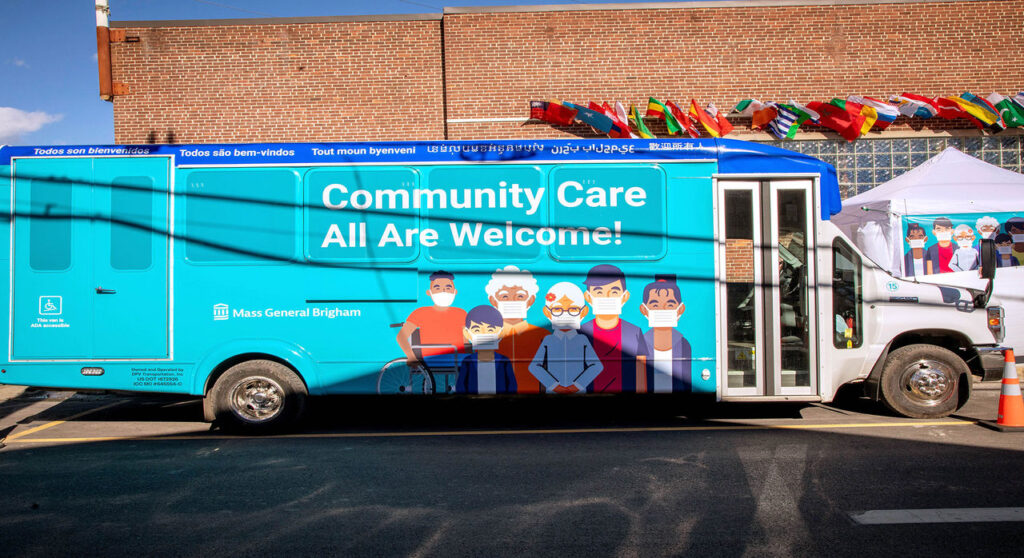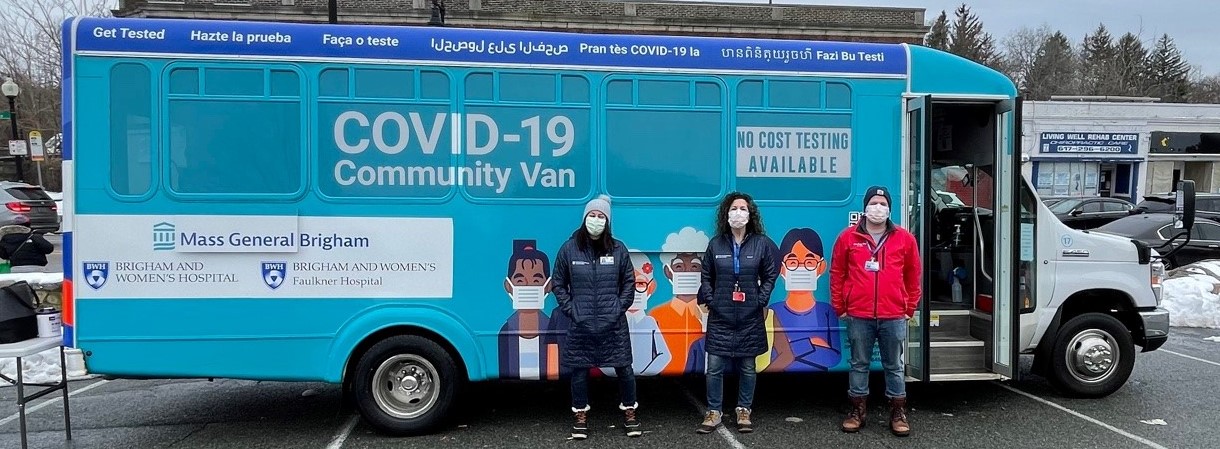
Data Show Mass General Brigham’s ‘Clinics on Wheels’ Increased Access to COVID-19 Services for Underserved Populations
Oct 12, 2022
- Mobile COVID-19 health units delivered an average of more than 150 vaccine doses per week during the study period
- Initiative vaccinated a significantly higher rate of young people, non-white populations, and Hispanic people than the average for the state and target communities
- Adaptable program also offers COVID-19 counseling and testing and can be expanded to address additional community health needs
Two new papers from Mass General Brigham demonstrate the effectiveness of bringing COVID-19 health care services to where people need them the most. At the beginning of May 2021, a team from Mass General Brigham began providing COVID vaccinations to underserved populations living in the greater Boston area by sending mobile health units to 12 predominantly low-income and racial/ethnic minority communities in Massachusetts. Using community health vans, teams offered easily accessible vaccination on a walk-in basis without regard to insurance, immigration status, or ability to pay. In a paper published today in The American Journal of Public Health, Mass General Brigham authors describe the success and challenges of the new program, which had higher vaccination rates among adolescents, non-white populations, and people of Hispanic ethnicity compared to vaccination rates in the state and in the local communities.
“To date, our program has provided almost 20,000 COVID-19 vaccination doses,” said corresponding author Priya Sarin Gupta, MD, MPH, medical director of the Mass General Brigham and Kraft Center Community Care Van Initiatives. “Our goal was to take COVID-19 health and vaccination services to the community and meet people where they are. The data from the first few months of Mass General Brigham’s Community Care Vans, sometimes called our ‘clinics on wheels,’ show us that if you build it — and you build it well — they will come.”
In their AJPH paper, Sarin Gupta and colleagues outline what it took to build their program well and implement it effectively. Key elements to the program included:
- Engaging and partnering with community nonprofit organizations, local departments of health, and school board representatives;
- Staffing vans with trained, multilingual staff members and engaging a large volunteer network;
- Identifying the right places and times to reach communities that have been hardest hit by COVID-19.
The program also used a “double equity” model, engaging with a local transportation company that was at risk of downsizing because of economic losses during the pandemic.
In a companion paper recently published in Preventive Medicine, investigators analyzed results from the first three months of the program. From May 20 to Aug. 18, 2021, the community health vans held 130 sessions and administered 2,622 COVID-19 vaccine doses. During the study, just 20 percent of people who received a vaccine from one of the mobile clinics self-identified as white. More than 56 percent listed their ethnicity as Hispanic (compared to the state’s vaccination rate of about 18 percent). Additionally, participants were more likely to be adolescents — the average age of people vaccinated at the mobile clinics was 31 years old. These early findings allowed the program to iterate and expand to more communities to maximize the program’s reach to communities serving people of color and those with high rates of health-related social needs.
The authors note that mobile health units could be used to help address other community health needs beyond – and sometimes entangled with — COVID-19. The vans are now expanding their offerings to include a menu of services to offer care for preventable and chronic conditions, including offering high-blood pressure screening.
“Already, we are seeing participants come to us who are interested in getting vaccinated, and also get screened for high-blood pressure while they are there — and vice versa,” said Sarin Gupta. “Some participants ask us, ‘What are you going to provide next?’ It gives me hope. If we can provide care with cultural humility and ensure that everyone has access, we can begin to overcome barriers such as mistrust.”
About Mass General Brigham
Mass General Brigham is an integrated academic health care system, uniting great minds to solve the hardest problems in medicine for our communities and the world. Mass General Brigham connects a full continuum of care across a system of academic medical centers, community and specialty hospitals, a health insurance plan, physician networks, community health centers, home care, and long-term care services. Mass General Brigham is a nonprofit organization committed to patient care, research, teaching, and service to the community. In addition, Mass General Brigham is one of the nation’s leading biomedical research organizations with several Harvard Medical School teaching hospitals. For more information, please visit massgeneralbrigham.org.
Community Care Vans
Our Community Care Vans are designed to expand access to health care services across the diverse communities in the Greater Boston area served by Mass General Brigham.
Mass General Brigham’s mobile medical Community Care Vans bring a broad menu of mobile medical services, including screenings and interventions for chronic health issues like hypertension, diabetes, and substance use disorders. The Community Care Vans, originally deployed during the height of the COVID-19 pandemic, are staffed with multilingual and multicultural clinicians and support staff to better connect with the communities served by Mass General Brigham.
In January of 2021, Mass General Brigham launched a fleet of Community Care Vans in our local communities hit hardest by the COVID-19 pandemic, providing COVID testing, vaccines, and reliable health information to patients and residents. Information and resources were provided in a variety of languages along with care kits containing items like masks and hand sanitizer.
As of May 2023, the Community Care Vans had administered more than 20,000 vaccines to community residents. To address social determinants of health, patients are screened for issues related to housing, access to healthy food, and personal safety, and connected with relevant resources.
Now, as COVID-19 transitions from an acute pandemic to a more endemic state, the Mass General Brigham mobile medical Community Care Vans have also evolved to meet people where they are and currently provide the following services:
- Hypertension and diabetes care: Screening and intervention, including blood pressure readings, lipid and A1C levels testing and physical activity assessments, titration of medication and connection to primary care medical homes
- Substance use disorder: Screening, treatment program referrals and recovery coaching
- Social risk mitigation: Ongoing assessments on social determinants of health (food, housing, etc.) with connection to services
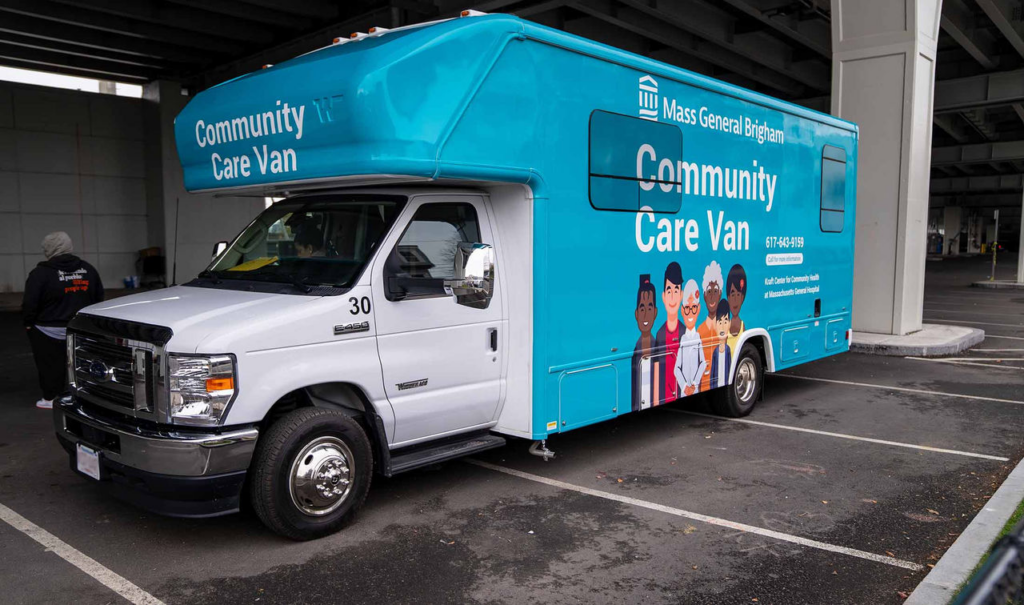
Partners with local business hard hit by COVID-19
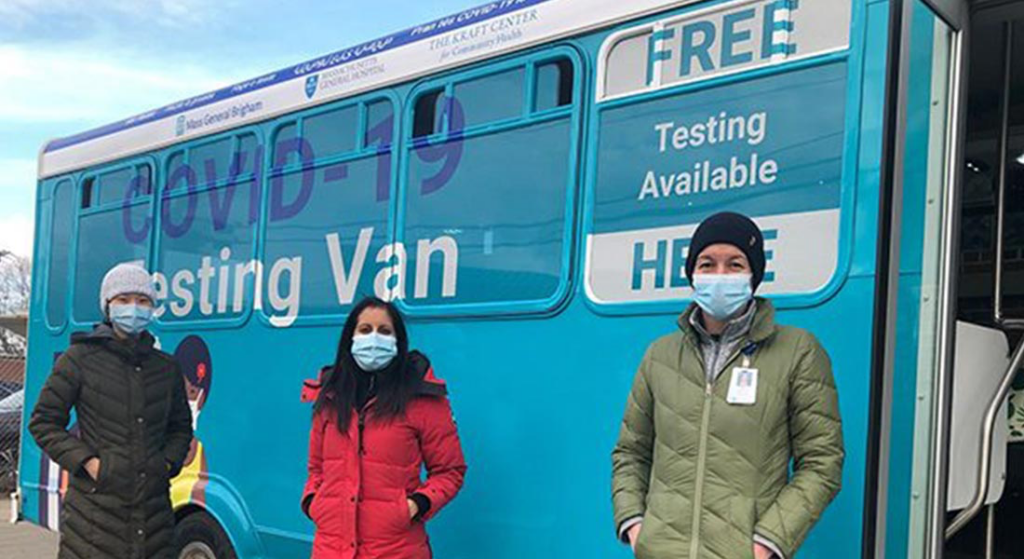
To better support the people who live and work in communities hardest hit by COVID-19, Mass General Brigham is launching a fleet of community health vans in partnership with DPV Transportation, a transportation company based in Everett. The vans will offer a variety of services including COVID-19 testing, informational resources in a variety of languages, and care-kits with items to help stop the spread of COVID-19.
“As we think about tackling inequities in health care, it’s essential that we build stronger ties to the communities that could use our support,” says Tom Sequist, MD, Chief Patient Experience and Equity Officer at Mass General Brigham. “These vans are helping us to bring resources directly to the people that need them most and are removing some of the barriers to health care that many face.”
The Kraft Center at Massachusetts General Hospital is one of the groups leveraging these new vans. With partial support through a National Institutes of Health (NIH) RADx-UP grant to expand COVID-19 testing for underserved populations, the Kraft Center is helping to coordinate walk-in, rapid testing in Chelsea, Revere, Everett, Lynn, and Charlestown. The vans will be located in heavily trafficked areas, at sites near food pantries, in proximity to schools and housing complexes, as well as in areas identified as hotspots by waste water surveillance. Van locations will be chosen in partnership with local community organizations.
After staffing the pop-up MGH Respiratory Illness Clinic in Chelsea for COVID patients this past spring, Priya Sarin Gupta, MD, Primary Care Physician at the MGH Charlestown HealthCare Center, has seen firsthand the overwhelming need for community-based clinical resources like these vans.
“One theme that emerged again and again at the respiratory illness clinic was the need to take COVID testing and care outside the brick and mortar operations and to meet our most vulnerable patients where they were at, in the community,” says Dr. Gupta.
Appointments are walk-in only, free of charge, and all members of the community are encouraged to visit. No ID is required for testing. The hope is that by broadly offering testing in hot-spot areas, providers will be able to better manage patients who are asymptomatic or who have only mild symptoms. This means asymptomatic or mild symptom patients will know to isolate and those who are at high-risk can better monitor their health should their illness become more severe.
“It is critical to ensure equitable access to diagnostic testing for COVID-19 and one way of doing so is making it as easy as possible, especially for vulnerable populations,” says Elsie M. Taveras, MD, MPH, Executive Director for the Kraft Center.
She explains that mobilizing clinical services can help support the response to COVID-19 and overcome longstanding barriers to care that vulnerable populations continue to experience. Her hope is that by offering free, accessible testing in the community, getting swabbed for COVID-19 will become more normalized and less burdensome.
Brigham and Women’s Hospital is also partnering with DPV to meet the needs of local communities. They plan to provide walk-up COVID testing, deliver care kits (which include masks, hand sanitizer, soap, and multi-lingual infection control tips), and information about the COVID-19 vaccine. This group will also be screening for Social Determinants of Health and connecting residents to local community resources. The van will be stationed at the historic Strand Theatre in the Upham’s Corner neighborhood of Dorchester in collaboration with Upham’s Corner Health Center.
While there are currently two vans deployed, the plan is that eventually five vans will be in circulation offering a variety of community health services related to COVID-19 support.
Jose Perez, Chief Operating Officer at DPV Transportation, is excited to be partnering with Mass General Brigham to directly support local communities.
Perez and his brother Daniel started DPV Transportation fifteen years ago out of their basement. In that time, the company has grown to more than 250 employees and expanded their offices to New York and Connecticut. Before COVID hit, the Perez brothers were on track to have their best year of business to date. But like many businesses, COVID-19 was disastrous for DPV. The company made the difficult decision to start layoffs and the team shrank by more than half.
“Our workers live in these communities that have been highly impacted. They understand how people are suffering from this pandemic,” says Perez. “We are really excited to be a part of this effort and we’re able to really participate in these communities in ways that other people can’t.”
Ingrid Beckles, Manager for Supplier Diversity at Mass General Brigham, says that she had been interested in working with DPV for years after connecting with them through the Greater New England Minority Supplier Development Council.
“It was just the matter of finding the right fit,” says Beckles. “When you work with someone like DPV, who is so invested in a diverse workplace, you end up with strong ties to local communities.”
Mass General Brigham’s new vans make health care accessible for local communities
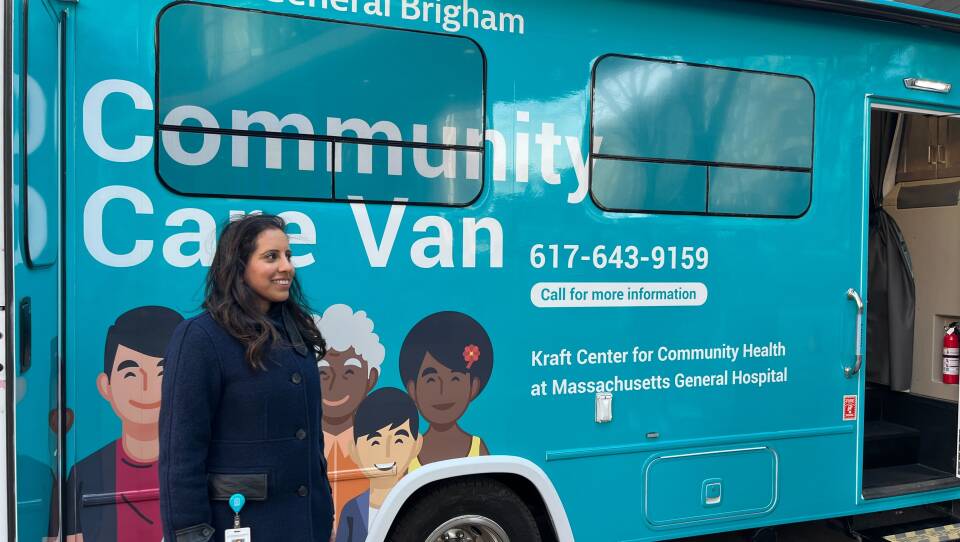
Newly designed “Community Care Vans” were unveiled by Mass General Brigham on Monday, as the hospital broadens its mobile health care outreach in Greater Boston.
The Community Care Van program was launched in 2021, as a way to provide COVID-19 vaccines during the height of the pandemic to the city’s most vulnerable residents. The program will now offer expanded services for cardiometabolic conditions like diabetes and hypertension, cancer screening, substance use disorder screening and treatment referrals and ongoing assessments based on social determinants of health.
“Now we have these clinics on wheels that really allow us to bring world class high quality care that individuals get when they walk into any of our brick and mortar facilities, right here out in the community,” said Dr. Priya Sarin Gupta, medical director for community-based clinical programs at Mass General Brigham.
Gupta said since the program launched in 2021, the vans have had over 25,000 patient encounters. In the past year they’ve seen nearly 7,000 just for cardiometabolic conditions.
The broadening of the program has also become a pillar of the hospital’s larger United Against Racism initiative — launched in 2020 — to address systemic racial inequities among patients, staff and the larger community. The vans currently serve Boston and North Shore neighborhoods.
“What this work allows us to do is really bring the care out to people for whom care often hasn’t been accessible, or they have huge mistrust about the healthcare system,” said Gupta. “And to bring it in a way that resonates with them.”
“It’s a dream come true for us to see the care continue to be accessible to my community,” Pastor “Keke” Dieufort Fleurissaint, president and executive director of the True Alliance Center, told GBH News.
Fleurissaint, who is Haitian and serves the Haitian community across Massachusetts, highlighted the importance of healthcare access for immigrants that is culturally competent. The mobile vans will be staffed with multilingual and multicultural staff.
“All the barriers, cultural barriers, language barriers — because those vans are being staffed by Haitian professionals … they can definitely help the patients get access to those cares,” he said.
“We are committed to caring not only for those patients who come through our doors every day, but also for the broader community, including those who often are not able to access traditional care, like communities of color who have borne the brunt of generational health inequities,” Dr. Anne Klibanski, president and chief executive officer of Mass General Brigham, said to the crowd of community partners and program staff at the unveiling outside the Prudential Center on Huntington Ave.
The three brand new vans each have a small reception area, Wi-Fi for patients while they wait, and an exam room like one you’d expect at the doctor’s office. Working with community partners on scheduling, the vans spend a maximum of four hours at each designated location.
“If they have any events going on, we’ll be there,” said Cesar Guerra, mobile operations manager. “We decide … the frequency, or how many times we can come to the community, depending on the need.”
For Guerra, it’s personal. He said the most fulfilling part of this work is serving his community.
“I work a lot in Chelsea. I work a lot in Revere. Those are communities that I’m a part of myself. So it just feels natural to kind of work in my own backyard,” he said.
Community Health and Wellness Team Takes to the Neighborhood in Community Health Van
From left: Community Health Program Coordinator Katie Plante, Director of Community Health and Wellness Tracy Sylven, CHHC, MCHES, and BWH ED Patient Navigator Joe Tulip
“People have so many needs,” says Brigham and Women’s Faulkner Hospital’s Director of Community Health and Wellness Tracy Sylven, CHHC, MCHES. “But it’s the connection to resources that is the challenge.”
For many residents of Boston’s neighborhoods, language barriers, lack of transportation and a host of other factors often stand between a person and proper healthcare for them and their family. The Community Health and Wellness team focuses their efforts on breaking down those barriers and bringing services to community members, right in their neighborhoods. Earlier this year, Sylven and her team gained access to use the Mass General Brigham/Brigham Health Community Health Van, allowing for safe, socially distanced interactions outdoors.
They use the van to offer resources, including masks and hand sanitizer, information about COVID-19 testing and vaccines, blood pressure checks, food and personal care items such as diapers, feminine products, etc. and information about voter registration. They also offer connections to resources like housing, food, legal services, healthcare and safety and can directly schedule an appointment for a vaccine.
“We have received so many donations, from food to diapers and everything in between,” says Sylven. “With the van, we are able to bring those items right into the community and distribute them where there is greatest need.”
The van makes weekly stops in neighborhoods hardest hit by COVID-19. In many of these neighborhoods, community members struggle with language barriers. Luckily, on board the van is an Interpreter on Wheels. Using an iPad, the team can easily connect with a trained interpreter to help provide health and wellness information in any of hundreds of languages.
“There was one day when I met a community member who only spoke Cantonese,” recalls Sylven. “He told me how isolated he has felt throughout the pandemic. He couldn’t access the important information he needed related to testing and vaccines and just felt so lonely and scared as a result. We were able to speak with him in Cantonese and help him find the information he so desperately needed.”
Sylven continues, “We recently received a gift from a generous donor who wants to help fund the Community Health Van going forward. As a result, we can continue to offer these much-needed services and even expand our reach.”
